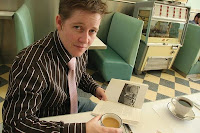
Given the recent developments between the Koreas, my email inbox has been flooded by concerned friends internationally. As I sit in a café amidst largely nonchalant Koreans enjoying their coffees and sharing the latest Miss A tunes with their ipods and iphones, I wonder how people in the USA can possibly entertain the notion that they have any part of the US global empire? Or put in other words, given the warped media façade presented in the American states, how can it be possible for voters there to actually have any hand in the affairs here or anywhere else? Do Americans think their hand fed opinions are there own? The Korean coverage and the talk on the street over the events here don’t remotely resemble the media frenzy as seen on T.V.: in the USA. Given this thought, I see a good opportunity to review The Land of the Banished by Cho Chong-Rae, as translated by Chun Kyung-Ja and published by the Jimoondang Publishing Company in 2001. This book revolves around the life of a political and social outcast. Cheon Mahn-seok, our protagonist and perhaps antagonist too, lives a life of horrors; these are both afflicted from external circumstance and from his reactions to these as well.
The character development alone make this book an extremely worthy read. Cho works by moving backward and forward through Cheon’s life, juxtaposing his predicament in the present with his childhood, adolescence, and adulthood. At the time we meet our hero he has already climbed his way into his last days as a well aged man. The man came into his lot as an outcast from the town of his youth by participating in the killing of the former classes of power after the rise of the People‘s Army. But the author, Cho, does not simply leave his protagonist's life simply as that of a demented murderer of the former ruling and exploitative class. He instead fleshes our Cheon out by showing how he could have behaved so callously in the aftermath of his rise to rank. Cheon Mahn-seok describes himself as a serf and slave, and a failed one at that.
Cheon lived a terrible life, feeling that even deigning to produce progeny would only bring another generation of slaves into the world to be exploited by the rich; this theme echoes itself by various names throughout the entire text. As a child, dependent as he was on his parents serfdom under a wealthy family’s heel, he scoured the forest in search of food, not for fun but out of necessity. After Mahn-seok saved a younger son of the Choe’s, his own family's lords, the older Choe brothers mistakenly took him as attacking their younger brother and attacked him only to lose due to their weak pampered lifestyles. After their defeat, Mahn-seok and his whole family were deprived of their status as even the serf’s of the Choe’s. He and his family were expelled from their duties as slaves and sent off with nothing. Thus, Cho builds a believable human narrative, even for our murderous anti-hero and protagonist.
Later, Mahn-seok had participated in the murder of the former ruling class as a young man. He had gone far further than his superior Su-gil, a Chairman of the local People’s Committee in killing off the former landlords. As such, after the reprisal and rise of the South in the town of Mahn-seok’s youth, he became unable to return. Even before the town was retaken by the South’s forces he had too become an outcast among the People’s Army. He managed this feat by slaying his wife along with her lover, Mahn-seok’s superior commander in the army. Thus, our character was more than deeply flawed; he was totally abandoned by all sides politically, socially, and had lost much of his humanity as well. Cho Chong-Rae’s piece stretches the boundaries of personal narrative by illuminating the causality of this protagonist’s life and what a reader can expect too. The calculus of human action and reaction throughout this tragedy remains unbelievable and believable as well. It also illustrates the causality of inhumanity in humanity.
The nuance of reason and counter reason on these pages demonstrates a Korea in self-reflection over its history and not the static Korea of Euro-American media representations. The authors in fiction demonstrate the same lucid contemplation over the political division as their political counterparts. The only simplistic analysis continue as ink on the pages of outsiders, largely in the US media. The recent events between the two Koreas should serve as a warning that the conducting of military exercises on contested seas between these severed families ought not to be taken lightly. Obviously, in point and fact, the North’s assault on civilian target was unacceptable. But the US media and her lover in arms, the US military, shouldn’t feed their audience in North America the message that the empire is needed here. Those who welcome US imperialism here are matched by those seeking its removal through protests which shame the anti-war movements in the US. Moreover, among those who desire the alliance’s continuance, many don’t want a provocative presence and less want permanent bases in the South.
Rather than pushing the North into a corner, space should be allotted for continued ties that develop under better circumstances. The South has investments in the North and mature or educated people here I talk with seek eventual cultural and social reconciliation. The US empire only aggravates and perpetuates a painful division. The US should most certainly maintain its interest in protecting its ally here, but aggravation is another issue altogether. Cho Chong-Rae’s character development show the subtleties of action and reaction. They show the light and shadow of real life. What Americans do not see in the real daily life of Korea is everything gray, everything nuanced, everything indispensable to a clear analysis.






